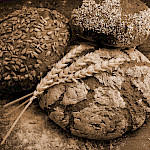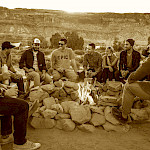It was borrowed
The prophets were engaged in building themselves a dwelling by the river Jordan. One of them was felling a beam when the head of the axe he was using fell into the water. With a feeling of regret and disappointment he exclaimed to Elisha, “Alas, master! for it was borrowed” (2 Kings 6:1-5).
Borrowed tools are rarely satisfactory. Skilled workmen will not use them if they can avoid it. The reason is they are strange and unwieldly in the hand of the user. Then there is always the possibility of an accident, as that which happened to the axe that the prophet was using, and this is undesirable for obvious reasons.
People like their own tools. A penman will carry his own pen and use no other if he can help it. A ploughman will use his own plough always in preference to another. A carpenter keeps his own kit of tools and is loath to lend them out. One can understand this, for people become accustomed to use certain things and know, by experience, just what they can do with them.
Applying this to the Christian, we would counsel him, since he is God’s workman, always to use his own tools. He should avoid in every possible way borrowing things from others, such as sermons, addresses, phrases, sayings, words, etc. If lie gets into the habit of borrowing, he may easily incur the danger oi losing every bit of originality and resource in himself, and become the slavish imitator, the servile dependent, of someone else.
Young Christians, who have their life before them, should cultivate the habit of studying Scripture for themselves. Knowledge of God, through communion with Him and study of His Word, is the great foundation of character, upon which the superstructure of virtue and usefulness in service may be raised. “All scripture is given by inspiration of God, and is profitable for doctrine, for re-proof, for correction, for instruction in righteousness: that the man of God may be perfect, throughly furnished unto all good works” (2 Tim. 3:16, 17).
Now if Scripture can do this, surely it is desirable, above everything else, that it should be the constant occupation of our thoughts. We should learn to think of Scripture, meditate upon it, pray over it. We do not disparage the ministry of others, whether oral or in print; but this should turn us back to Scripture, and then the Spirit will reveal wonderful things to us of God, His love and grace.
And when we have made something definitely our own, derived directly from God’s Word through meditation therein, we can always use this with power and freshness for the blessing of others. Then others, who have the Spirit, the same as ourselves, readily perceive that what we give them is original; that is, derived directly from God’s Word, something we have enjoyed ourselves as from God. This, of course, is not borrowed from others.
Many Christians lead an easy-going and superficial life. They are content with a text from the calendar, a few lines of poetry, a passage from some book composed for daily guidance. But this may be, to a large extent, borrowed, in that it is what others have gathered, and not what they have gleaned for themselves. This makes all the difference. The manna was gathered every morning by those who lived by it. They had to gather it for themselves, appropriate it, and live by it. So it is today with the Christian; he should read Scripture daily and get his spiritual nourishment from that source.
And, if it is undesirable to borrow from others in the matter of reading, etc., it is also undesirable that we should confront the enemy in borrowed armour. David assayed to go in Saul’s armour to meet Goliath. But it did not answer. It was borrowed armour. What was suitable and serviceable to Saul was cumbersome impediment to David. The ponderous brass helmet, the unwieldy coat of mail, the heavy sword, all of which were untried, could but place him before Goliath as a target, rather than equip him for victory. It was no wonder the shepherd lad, finding himself at great disadvantage with his borrowed outfit, said to Saul, “I cannot go with these; for I have not proved them” (1 Sam. 17:38, 39).
The fact is, none of us as warriors can go in what we have not proved. Experience of God, such as David had when he tended his father’s sheep, is the only thing that will equip us for victory. David could slay a lion and bear by the strength he received from God. We too get strength from God to meet temptations, surmount difficulties, overthrow spiritual foes, and triumph all along the path of faith. Secret dealing with God is the only equipment. We learn in this secret way how frail we are in ourselves, how strong God is; that His strength is made perfect in our weakness; that His Name is a strong tower into which we can run and be safe—all this is armour for conflict. But it is not borrowed, or second-hand; it is experimental, something gained by secret communion with God.
Parents would often arm their children as Saul armed David, but it will not answer. Each one must stand on his own feet in conflict; and in order to triumph, each one must know his God in secret help, just as David knew Him, while he was in this secret place of training. Without this public testimony will be a failure. A mother once said to her boy who was going into the world to earn his living: “If I could give you my experience of God, I would give it to you gladly; but you must get your own from God, for this alone will serve you in life’s conflict.” She was right.
Previous article




